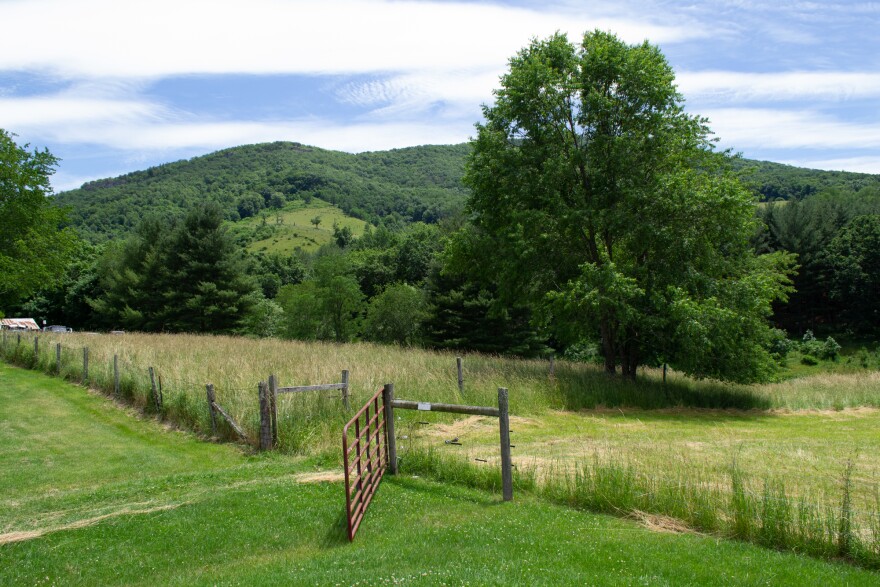A statewide tax program incentivizes property owners to keep land in farming and other undeveloped uses – but signing up and staying enrolled can be a complex process. And one couple got ensnared in the bureaucracy in Albemarle County. WMRA's Randi B. Hagi reports.
Since 1974, Virginia has had a tax relief program aimed at preserving rural lands. The land use-value taxation program allows owners in participating jurisdictions, with at least five acres, to have their property value assessed based on its use as agricultural or undeveloped land – rather than at market value – so their tax bill is lower.
If that sounds complicated, it is! Jenn Friedel, director of the Land Use-Value Assessment Program and a professor at Virginia Tech, helped break it down for me. She said every state has some version of this.
JENN FRIEDEL: The idea was, as we looked at jurisdictions with development pressures, with farmland disappearing, with property tax increases due to significant increases in fair market value, how do we preserve the nature of our communities, preserve the open space, preserve the forest lands, and preserve the agriculture and horticulture land?
Her office is in charge of calculating the appropriate lower-than-market-rate property values, which are published every year and given to counties and cities as a guideline. There are two different ways they calculate it. One is the "income approach," looking at how profitable farms usually are in that area.
FRIEDEL: So it might be that this jurisdiction, they've got 2,000 acres of corn and 3,000 acres of wheat and a couple thousand acres of soybeans, whatever it is, and so then we look at the net returns of each of those crops, and then we come up with that per-acre net return.
In Albemarle County, that would be, on average, less than $300 per acre. That results in a significantly lowered real estate tax bill in a place where undeveloped lots are going for an average of $27,000 per acre, based on Zillow records of recent sales.
The other way Friedel's office calculates use value is the "rental rate approach."
FRIEDEL: This would be what someone might, in this county, pay for rent for cropland.
Going back to Albemarle County, that would mean enrolled land is valued around $400 per acre – which is the method they use. There are currently 3,768 parcels enrolled in the program in Albemarle, totalling over 200,000 acres. The majority of them are used for cow and hay operations.

The tax break was attractive to Cynthia and Lawrence Gasman, who owned rolling pasture land outside of Crozet before they sold the property last year.
CYNTHIA GASMAN: The 23 acres has a pond. It has streams on three sides … and we made horse pastures … and started with one horse, and then we got another horse, then we got another horse.
The Gasmans signed up for land use-value taxation under the "open space" category in 2016, agreeing to raise their Peruvian horses without developing the land beyond the existing 1910 farmhouse and cottage. With the help of a lawyer, they submitted an application and "open space use agreement" to the county. Every other year, they filled out a revalidation form that the county sent out. But when they prepared to sell the property last year, the buyers found out that the agreement had expired in 2021, even though –
LAWRENCE GASMAN: They went on sending us the two-year form long after the thing had expired.
CYNTHIA GASMAN: … Leading us to believe that our open space agreement was still in effect.

With the discovery of that expiration came a bill. The county told the Gasmans they owed $17,000 for the previous two years' real estate taxes.
CYNTHIA GASMAN: You get a rollback tax imposed if the use of the property changes, but the use of the property did not change.
They paid the bill, but also challenged it. The county assessor's office told them they would consult with the Virginia Department of Conservation and Recreation, and as of the airing of this story, have not made a final decision.
The county's communications and public engagement manager, Abbey Stumpf, said she and Assessor Peter Lynch couldn't comment on any specific cases, but they did answer general questions about the program.
Each open space use agreement only lasts for a period of four to 10 years, as determined by the landowner and county in the original application. That's what expired in 2021 for the Gasmans. The revalidation form that goes out every other year asks the landowner to certify they have a current agreement on the books.
As Lynch puts it,
PETER LYNCH: It's just a very complicated program. … Not everybody just raises cows on a property or cuts hay on a property. … So that can cause a lot of questions … when it comes to determining whether they are qualified to be in the program, or whether a rollback is required in a specific situation.
He said his office is careful to document the circumstances that warrant rollback taxes, and if challenged, they will consider additional information from the landower. Above him is the county's Board of Equalization, although they're only authorized to hear cases on the current year's assessment values.
LYNCH: They've never had an actual appeal on a rollback since I've been here, in the last nine years. … Above that, the circuit court would make determinations, whether the finding of rollback was appropriate or not.
The Gasmans, now retired outside of Richmond with their last remaining horse – actually, their original, 26-year-old mare – told me this isn't going to sink them. But it would be nice to get that $17,000 back.


